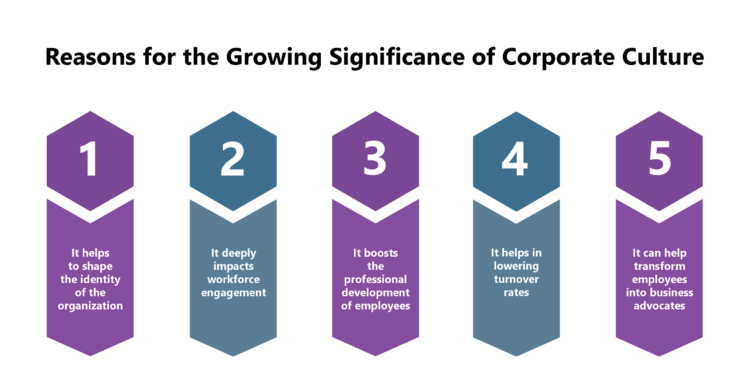1. Shapes Organizational Identity: Corporate culture defines how the organization operates and interacts with its employees, customers, and partners, influencing both its internal and external perceptions.
2. Boosts Employee Engagement: A positive work culture enhances employee engagement and productivity, with flexible and supportive environments that foster a better work-life balance.
3. Supports Professional Development: A healthy work culture encourages teamwork and skill development, motivating employees to grow professionally through collaboration and competition.
4. Reduces Turnover: A robust corporate culture enhances employee satisfaction and loyalty, thereby reducing turnover and promoting long-term retention and advocacy for the organization.
No matter how small, every organization has a unique set of shared values and practices, referred to as its corporate culture. This culture reflects the organization’s unique personality and conveys its core values, ethics, behaviors, and beliefs.

It would not be wrong to state that the corporate culture decides the social and psychological environment within an organization.
It provides employees with clear guidelines on how to act, feel, and think.
In a bad corporate culture, employees act as individuals and work only for pay and benefits.

A healthy corporate culture motivates employees to value their co-workers irrespective of their roles and responsibilities and promotes teamwork.
Such a culture that aligns with collaboration. It puts organizational growth and success above everything else.
A healthy corporate culture effectively enhances business performance and drives engagement.

Corporate culture has become essential in ensuring an organization’s growth and success.
Modern work culture has become more employee-centric and is key to attracting and retaining the best employees.

Today, employees prefer to work for organizations with a culture based on growth and transparency.
Hence, they avoid joining organizations that follow a traditional management system, which offers little flexibility and limited growth opportunities.
Here are the reasons that make a corporate culture so important:
1. Helps to shape the identity of the organization
2. Deeply impacts workforce engagement
3. Boosts the professional development of employees
4. Helps in lowering turnover rates
5. Can help transform employees into business advocates


The organization’s culture allows employees and others to understand how the business operates internally and externally.
It guides how employees interact and behave with one another as well as with customers, partners, suppliers, and others.
The culture reverberates across all aspects and defines how employees and customers perceive the organization.

It is a well-known fact that engagement directly correlates with business productivity.
A highly engaged workforce is more committed to ensuring organizational success and puts in its best efforts.
In this context, a healthy corporate culture can go a long way in boosting employee engagement levels.
For example, a flexible working culture can ensure a better career-life balance for its employees.
It paves the way for creating a more productive and highly engaged workforce.

As mentioned, a healthy work culture aligns with a deep sense of teamwork and co-worker coordination.
It, in turn, helps enhance individual employees’ professional development through healthy competition.
Employees feel motivated to learn new skills and improve their performance to make a positive contribution to organizational growth.
In many cases, employees are willing to offer help and support to co-workers to learn new skills.

An excellent corporate culture leads to happier employees, who are reluctant to seek other job opportunities.
When organizations value their employees for their contributions and achievements, it boosts employee motivation, morale, and a sense of belongingness.
Thus, they can retain valuable employees and reduce the costs of hiring and training new ones.
For example, employees who enjoy good work-life balance and freedom of expression in their current organization may turn down lucrative job offers from organizations with poor corporate culture.

Another reason why corporate culture is so significant is that it encourages employees to promote their organization wherever possible.
When employees feel happy with the corporate culture they are likely to boast about it in their social circles.
Employees often highlight the positive aspects of their corporate culture on social media, contributing to a positive brand image for their organization.
For most professionals today, there is a growing significance of corporate culture as an important deciding factor for accepting job opportunities or staying on with an organization.
That is why organizations should strive to build an exceptional corporate culture that gives them a competitive edge and drives success.

Lead author: Sagar Chaudhuri, the Co-Founder and CEO of HiFives. He is an HR Tech Evangelist with over 25 years of experience in both corporate and entrepreneurial settings. Previously, Sagar has held leadership roles with companies such as Genpact, Infosys, and ICICI Bank. He has an engineering degree from IIT Kharagpur and an MBA from IIM Lucknow. Connect on LinkedIn
To stay updated on the latest HiFives blogs, follow us on Twitter (@MyHiFives)